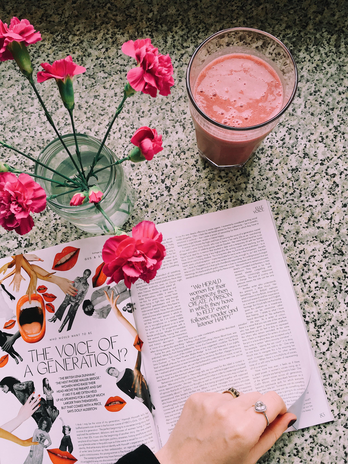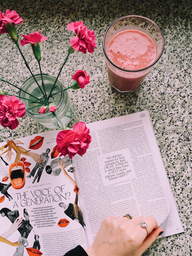Seeing the “clean girl” aesthetic – featuring slicked-back hair and gold hoops – brings back memories for many South Asian girls. But rather than hair gel or a claw clip, our “clean girl” mindset is our moms massaging oil into our hair to nourish it and keep it from tangling. Of course, when my mother did this to me as a child, I never saw myself as “clean”. According to the confused frowns and scrunched up faces of my classmates when I walked into school with a tightly coiled, gleaming braid, the routine that generations of women before me followed was anything but normal. Eventually, I agreed with them, complaining every time my mom sat me down on Sunday afternoon.
I quickly learned that we take what we have for granted until it’s gone. Junior year of high school, the stress and anxiety of my coursework took a toll on my hair. I began to experience what’s known as telogen effluvium – where large amounts of hair fall out due to external stress or a traumatic event. My years of letting my hair down as soon as I got to school and refusing the “smelly” oils on my scalp caught up to me in the worst way possible, and my hair began to thin rapidly.
Although the hair fall was what triggered me to start oiling my hair again, doing so became a way to de-stress and to feel connected to something larger than myself. Life seemed less difficult on hair wash days, as I applied oil and herbal packs made by my mom to my hair. I no longer cared whether oiled-up hair made me “dirty” or “unclean”: in fact, it made me feel as if something more than my hair was growing back. Perhaps what was really growing was my confidence, as I realized that regardless of current trends or aesthetics, I was doing what was best for my hair.
That isn’t to say that prioritizing my hair routine is easy. Two hours of Sunday are dedicated to oiling it, applying a mix of Ayurvedic (traditional Indian medical) herbs-amla (gooseberry), shikakai, rosemary, and castor oil among them – and even orange peel extract to add gloss before it’s all washed off. My friends can attest to the fact that I use “sorry I have to wash my hair” as a legitimate excuse. And many of them find that “brown girl hair care” is extremely difficult to keep up in college.
But what distinguishes Indian women’s hair care is that it has always been accessible and equal, even thousands of years ago. No matter social status or wealth, oiling one’s hair was part of the fabric of womanhood in ancient India. It was a love language, grinding herbs and heating oil and braiding until our hair shines. And slowly, our hair routines are becoming integrated into the fabric of American beauty trends as well. Whether it’s the iconic scene of the Sharma sisters or new products based on herbal treatments – made by Desi women – it is much easier to take care of your strands the way your mother did.
One of my favorite brands that embodies this tradition is Shaz and Kiks, an Austin-based brand made by two sisters (hence the name!). All of their products are based on the herbal flowers in the Himalayas that their grandmother often used for hair care: some of my favorites include the Scalp + Hair Prewash. It contains 20 Ayurvedic herbs and oils, but in a creamy format to avoid the difficulty of washing oil out of your hair. The packaging is also so pretty and space-saving for those in college!
As life gets more hectic, self-care is extremely important. But it takes on a new meaning when you realize that even if their worries were different, the women before us found the same peace in taking care of themselves. My hair, in its oiled, slicked back ponytail, is more than a one-time hairstyle: weaved within the strands are generations of women taking care of other women.


